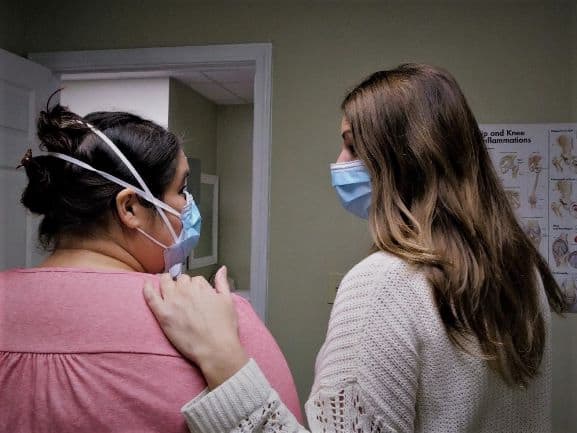
Is it ok for a physical therapist to have a patient as a friend, or a friend as a patient? It turns out that is a complicated question. In healthcare it is expected that practitioners will maintain a professional boundary with patients, keeping our personal lives separate.
Why? Objectivity can help us to make difficult decisions if we have to. For example, it can help us to recognize when physical therapy is no longer warranted, even if our patient wants to continue. Maintaining professionalism helps to establish our authority and expertise in the eyes of our patients, and a patient may be less likely to accept the medical advice of a friend. Also, personal and professional limits can help us to leave behind the emotion of work at the end of the day, which can be invaluable to our mental health.
But then there is the flip side.
In physical therapy, particularly in an outpatient setting, we spend more time with our patients than most medical professionals. With some variability, we see our patients a couple of times a week for maybe thirty minutes to an hour, for several weeks on end. We get to know them, and it’s not always easy to maintain that boundary. Physical therapy is a caring profession, and in addition to the time spent with our patients, it is literally a hands-on effort. That healing physical connection creates trust and can build a bond faster than words alone.
This leads to a lot of gray areas and a lot of questions.
Can We Be Friends With Our Patients?
What if there is somebody you connect with and in any other circumstance would be their friend? What if you live and work in a small community and you know your patients from another area of life? What if you decide to hold off on any personal relationship until after you are no longer their therapist, but then they need PT again in the future? We are living in a digital world; what if a patient sends us a request to connect on social media? Do we want to open up that side of our lives to our patients?
I’ve seen a lot of my peers with different opinions and practices when it comes to getting personal with patients. And in researching this topic there’s not a ton of guidance. As far as I have found, our physical therapy practice act does not give any clear guidelines. Most of the information out there is specific to physicians, but the consensus recommends maintaining that boundary. But there’s even some gray area there. Where does this leave us?
Risks of Befriending Patients
I don’t have all the answers, but I can understand the risks of having a patient as a friend. First of all, we could lose that objectivity. This person is now a friend, a relationship that comes with a different set of obligations. What if the professional relationship is unsuccessful? The therapist may keep trying beyond what they normally would because they want to help their friend, and this could delay further medical attention if needed. The friend/patient may not want to admit either non-compliance or if the treatment isn’t working to make them feel better.
Secondly, our knowledge of each other’s personal lives may lead to a lack of communication within a professional environment. The therapist may make assumptions instead of asking thorough questions. The patient may not provide important information if it feels embarrassing or too personal.
Third, there is a clear financial risk. If a patient’s insurance benefit runs out, will they expect or ask you to continue to treat them despite the loss to you?
Finally, what if something happens within your personal relationship that then makes maintaining your professional relationship difficult? If your friendship is struggling, will that patient be willing to continue the treatment that they need?
Possibility of Being Friend & Therapist
So far this hasn’t been a particularly uplifting message, or at least not what some want to hear, but I think this is a valuable discussion to have. Talk it over with your peers. Where do they stand on the topic? Where do you stand on this topic? (I’d love to hear!)
There are certain circumstances where treating your friends is unavoidable, particularly in rural areas. (Or if, in my case, you work in the smallest state in the union and everybody knows everybody.) The best thing we can do is communicate. Discuss the relationships with your friend/patient, and agree on the boundaries. I believe it is possible to successfully have a patient as a friend in physical therapy, but you need to be upfront with your patients, and with yourself. If you are in this situation, check yourself now and again. Examine your behavior to ensure that you are providing ethical and optimal treatment while being a good friend.

Recent Comments